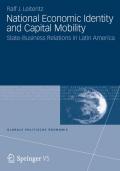
National economic identity and capital mobility: state-business relations in Latin America
Leiteritz, Ralf J.
Why has capital account liberalization been a durable policy in some countries, but not in others? The book uses the contrast between the path pursued by Peru and Colombia regarding capital account policy during the last twenty yearsin order to identify two critical factors to account for this puzzle. First, changes in domestic informal institutions - defined as shared collective understandings about legitimate economic policies - are a necessary element of sustainable capital account policy choices. Only if the remains of the previous model of economic development associated with state intervention have been purged from the set of acceptable policies, does capital account openness persist over time. Second, sustainable capital account liberalization presupposes that business-government relations privilege the interests of economic sectors thatdepend on the unfettered flow of international capital and are largely unaffected by exchange-rate volatility over the interests of exporters of non-traditional goods worried about exchange-rate appreciation in the context of capitalaccount openness. INDICE: The Economics of Capital Account Policy.- The International Monetary Fund and Capital Account Liberalization. A Case of Failed Norm Institutionalization.- Capital Account Policy in Peru. The Institutional Legacies of the Economic Crisis.- Capital Account Policy in Colombia. The Institutional Legacies of Pragmatism.- Conclusions.- Appendix 1: List of Interviewees.- Appendix 2:Survey Questions for Foreign-trained Elite Economists in Colombia and Peru.
- ISBN: 978-3-531-18528-6
- Editorial: Springer VS
- Encuadernacion: Rústica
- Fecha Publicación: 13/04/2012
- Nº Volúmenes: 1
- Idioma: Inglés
